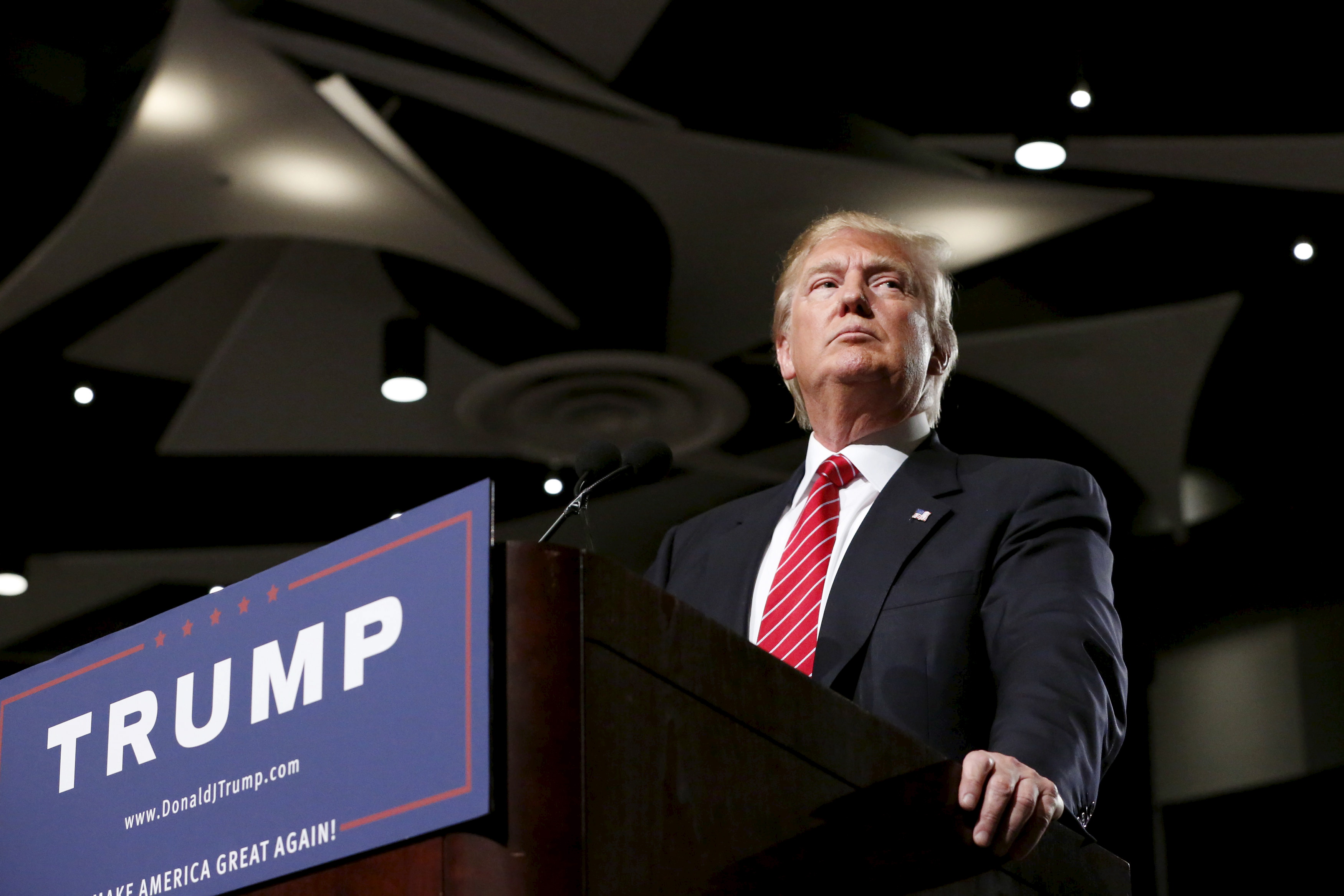Donald Trump is over this whole presidency thing
Does Trump even want to be president anymore? It sure doesn't seem like it.


Sometimes it looks like Donald Trump really doesn't want to be president of the United States. The unconventional nature of his campaign — dependent on free media, self-financing, and attention-grabbing — seems more and more like a kind of calculated malpractice or negligence. When he should be consolidating his hold over the party, he is instead repelling endorsements and muddying his own message. It makes you think he wants this road show to end — and soon.
Trump's campaign is designed on the premise that he never needs to buy attention that he can just take for free. And so he doesn't buy commercial time. Trump has also taken a long break from campaigning hard in the last few weeks. Meanwhile Ted Cruz's campaign is doing lots of legwork in trying to master the delegate selection process, and using organizational pressure to take delegates from Trump by any means possible. Trump's response is to threaten to sue. Or to make noise about withdrawing his pledge to support the nominee. None of these things are actually productive.
Earlier in the campaign, Trump seemed to be stumbling onto a politically coherent challenge to conservative and liberal orthodoxies: European-style nationalism. But over the past two months, he has slowly backed away from or disavowed his own policy agenda on immigration or trade. He has described his own rhetoric on these issues as a kind of opening gambit in a larger negotiation, rather than the announcement of some kind of principle. He has telegraphed over and over again that he doesn't intend to deliver, that these bold positions were merely an expediency toward standing out from a crowd of 17 candidates.
The Week
Escape your echo chamber. Get the facts behind the news, plus analysis from multiple perspectives.

Sign up for The Week's Free Newsletters
From our morning news briefing to a weekly Good News Newsletter, get the best of The Week delivered directly to your inbox.
From our morning news briefing to a weekly Good News Newsletter, get the best of The Week delivered directly to your inbox.
The lack of principle extends to his campaign. Trump has promoted himself as a man who isn't going to be bought by the special interests because, to this point, he has been self-funding his campaign. But that is not his strategy for the general election, according to reports in The Washington Post. Much of the money Trump has spent on staging rallies and flying around the country has been loaned to the campaign from Trump. That means if Trump begins fundraising in earnest for a general election challenge, Trump will direct donated campaign money back to himself. And yet, according to a detailed look inside the Trump campaign by Gabriel Sherman, Team Trump has barely organized a financial committee or fundraising operation. Either Trump is expecting Republicans, in desperation, to build him a fundraising apparatus from scratch or he expects that free media will be enough in the general election. Or perhaps he doesn't really anticipate being the nominee.
Trump doesn't even bother to understand the positions he takes cynically. See the mess he made of abortion. He has praised Planned Parenthood in the past. Then last week he told Chris Matthews that women should be punished for having abortions, a position most pro-lifers strenuously oppose themselves. Then he said that the laws allowing abortions should remain. Overall he took five positions in three days. He also begged off answering Maureen Dowd's question on whether he had ever been involved in an abortion himself. This level of incompetence suggests something deeper, like the way an amateur who is failing on stage at the Apollo would look to the wings, hoping that the Sandman would come out and dance him off the stage.
There is other evidence that Trump never wanted this. The former communications director for the short-lived Trump super PAC confessed that the campaign started out as a vehicle for protest, not for the White House itself:
Almost a year ago, recruited for my public relations and public policy expertise, I sat in Trump Tower being told that the goal was to get The Donald to poll in double digits and come in second in delegate count. That was it.The Trump camp would have been satisfied to see him polling at 12 percent and taking second place to a candidate who might hold 50 percent. His candidacy was a protest candidacy. [xoJane]
Alas, if it is a protest, it has gotten to the point where Trump's campaign will almost certainly doom Republican hopes in November. He either becomes the nominee, the most broadly unpopular one in several decades, or he loses the nomination to someone that Trump's fans deem a schemer or interloper. Disaffection is the only result.
A free daily email with the biggest news stories of the day – and the best features from TheWeek.com
There is a lifelessness to the Trump campaign lately, a kind of refusal to stand up and do the hard work of reuniting a party that he has shattered or building an organization that can mount an effective national campaign. There is no reason to doubt that Donald Trump sincerely wanted to shake up this election. But there are now too many reasons to doubt he really wants to win it.
Michael Brendan Dougherty is senior correspondent at TheWeek.com. He is the founder and editor of The Slurve, a newsletter about baseball. His work has appeared in The New York Times Magazine, ESPN Magazine, Slate and The American Conservative.
-
 Is the US about to lose its measles elimination status?
Is the US about to lose its measles elimination status?Today's Big Question Cases are skyrocketing
-
 ‘No one is exempt from responsibility, and especially not elite sport circuits’
‘No one is exempt from responsibility, and especially not elite sport circuits’Instant Opinion Opinion, comment and editorials of the day
-
 Businesses are caught in the middle of ICE activities
Businesses are caught in the middle of ICE activitiesIn the Spotlight Many companies are being forced to choose a side in the ICE debate
-
 The billionaires’ wealth tax: a catastrophe for California?
The billionaires’ wealth tax: a catastrophe for California?Talking Point Peter Thiel and Larry Page preparing to change state residency
-
 Bari Weiss’ ‘60 Minutes’ scandal is about more than one report
Bari Weiss’ ‘60 Minutes’ scandal is about more than one reportIN THE SPOTLIGHT By blocking an approved segment on a controversial prison holding US deportees in El Salvador, the editor-in-chief of CBS News has become the main story
-
 Has Zohran Mamdani shown the Democrats how to win again?
Has Zohran Mamdani shown the Democrats how to win again?Today’s Big Question New York City mayoral election touted as victory for left-wing populists but moderate centrist wins elsewhere present more complex path for Democratic Party
-
 Millions turn out for anti-Trump ‘No Kings’ rallies
Millions turn out for anti-Trump ‘No Kings’ ralliesSpeed Read An estimated 7 million people participated, 2 million more than at the first ‘No Kings’ protest in June
-
 Ghislaine Maxwell: angling for a Trump pardon
Ghislaine Maxwell: angling for a Trump pardonTalking Point Convicted sex trafficker's testimony could shed new light on president's links to Jeffrey Epstein
-
 The last words and final moments of 40 presidents
The last words and final moments of 40 presidentsThe Explainer Some are eloquent quotes worthy of the holders of the highest office in the nation, and others... aren't
-
 The JFK files: the truth at last?
The JFK files: the truth at last?In The Spotlight More than 64,000 previously classified documents relating the 1963 assassination of John F. Kennedy have been released by the Trump administration
-
 'Seriously, not literally': how should the world take Donald Trump?
'Seriously, not literally': how should the world take Donald Trump?Today's big question White House rhetoric and reality look likely to become increasingly blurred
